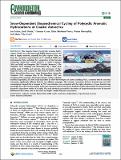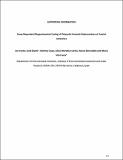Por favor, use este identificador para citar o enlazar a este item:
http://hdl.handle.net/10261/288313COMPARTIR / EXPORTAR:
 SHARE SHARE
 CORE
BASE CORE
BASE
|
|
| Visualizar otros formatos: MARC | Dublin Core | RDF | ORE | MODS | METS | DIDL | DATACITE | |

| Título: | Snow-Dependent Biogeochemical Cycling of Polycyclic Aromatic Hydrocarbons at Coastal Antarctica |
Autor: | Iriarte, Jon CSIC ORCID; Dachs, Jordi CSIC ORCID; Casas, Gemma CSIC ORCID; Martínez-Varela, Alicia CSIC ORCID; Berrojalbiz, Naiara CSIC ORCID; Vila-Costa, Maria CSIC ORCID | Palabras clave: | Polycyclic aromatic hydrocarbons PAH Biodegradation Biogeochemical processes Coastal Antarctica Marine bacterial communities |
Fecha de publicación: | 31-ene-2023 | Editor: | American Chemical Society | Citación: | Environmental Science and Technology 57 (4): 1625–1636 (2023) | Resumen: | The temporal trend of polycyclic aromatic hydrocarbons (PAHs) in coastal waters with highly dynamic sources and sinks is largely unknown, especially for polar regions. Here, we show the concurrent measurements of 73 individual PAHs and environmental data, including the composition of the bacterial community, during three austral summers at coastal Livingston (2015 and 2018) and Deception (2017) islands (Antarctica). The Livingston 2015 campaign was characterized by a larger snow melting input of PAHs and nutrients. The assessment of PAH diagnostic ratios, such as parent to alkyl-PAHs or LMW to HMW PAHs, showed that there was a larger biodegradation during the Livingston 2015 campaign than in the Deception 2017 and Livingston 2018 campaigns. The biogeochemical cycling, including microbial degradation, was thus yearly dependent on snow-derived inputs of matter, including PAHs, consistent with the microbial community significantly different between the different campaigns. The bivariate correlations between bacterial taxa and PAH concentrations showed that a decrease in PAH concentrations was concurrent with the higher abundance of some bacterial taxa, specifically the order Pseudomonadales in the class Gammaproteobacteria, known facultative hydrocarbonoclastic bacteria previously reported in degradation studies of oil spills. The work shows the potential for elucidation of biogeochemical processes by intensive field-derived time series, even in the harsh and highly variable Antarctic environment. | Versión del editor: | https://doi.org/10.1021/acs.est.2c05583 | URI: | http://hdl.handle.net/10261/288313 | DOI: | 10.1021/acs.est.2c05583 | ISSN: | 0013936X |
| Aparece en las colecciones: | (IDAEA) Artículos |
Ficheros en este ítem:
| Fichero | Descripción | Tamaño | Formato | |
|---|---|---|---|---|
| acs.est.2c05583.pdf | Artículo principal | 8,11 MB | Adobe PDF |  Visualizar/Abrir |
| es2c05583_si_001.pdf | Material suplementario | 2,98 MB | Adobe PDF |  Visualizar/Abrir |
CORE Recommender
SCOPUSTM
Citations
5
checked on 14-abr-2024
WEB OF SCIENCETM
Citations
3
checked on 22-feb-2024
Page view(s)
27
checked on 18-abr-2024
Download(s)
54
checked on 18-abr-2024
Google ScholarTM
Check
Altmetric
Altmetric
NOTA: Los ítems de Digital.CSIC están protegidos por copyright, con todos los derechos reservados, a menos que se indique lo contrario.
